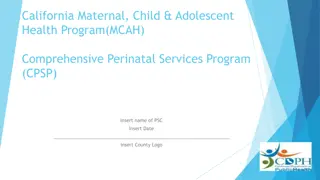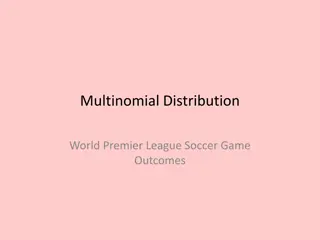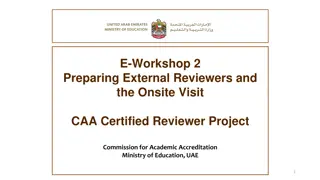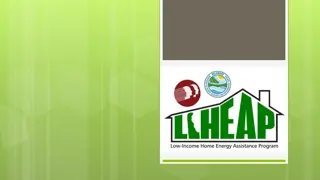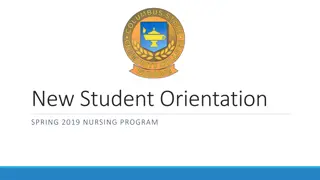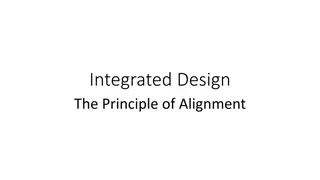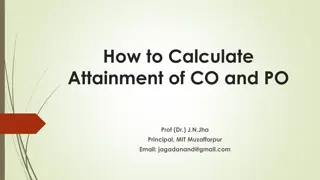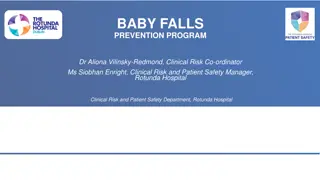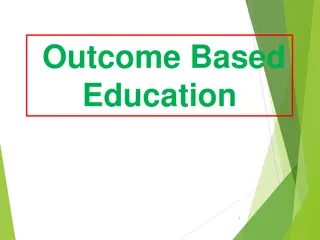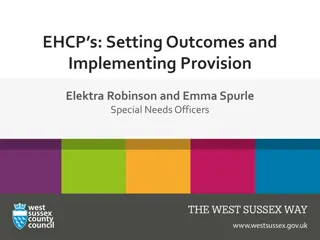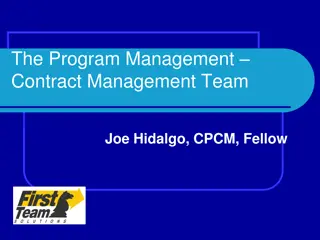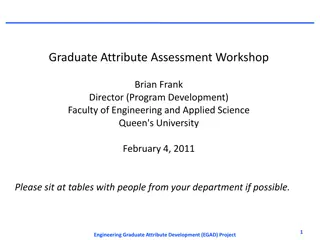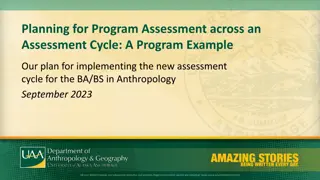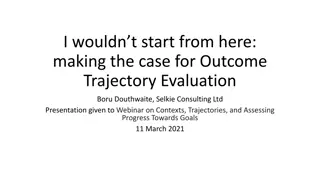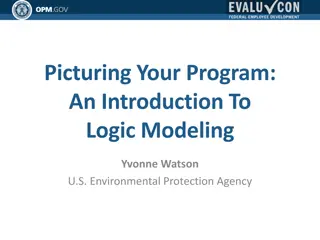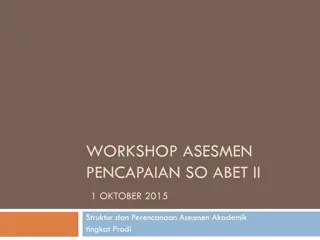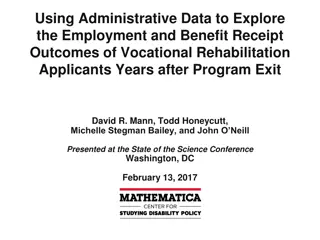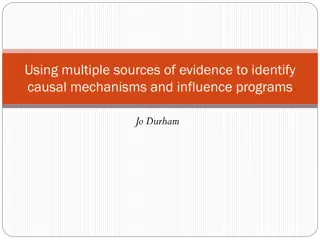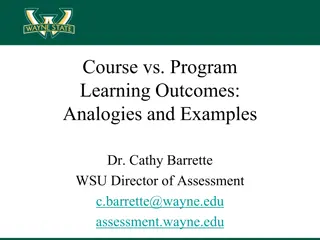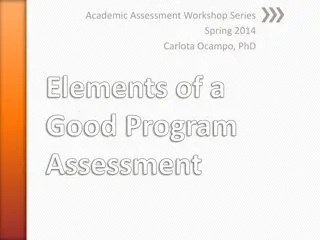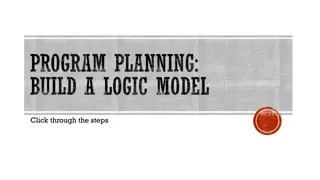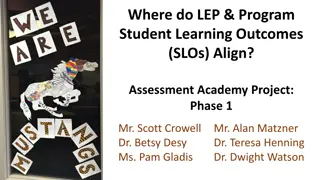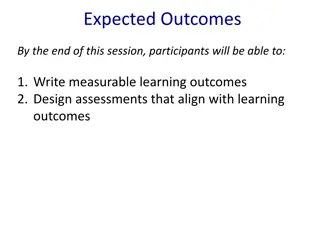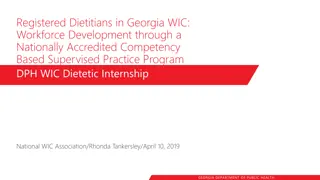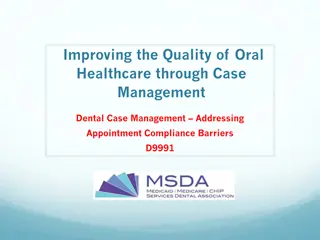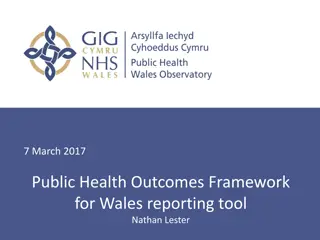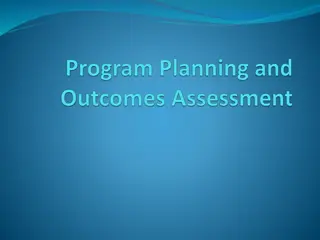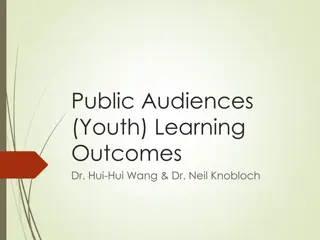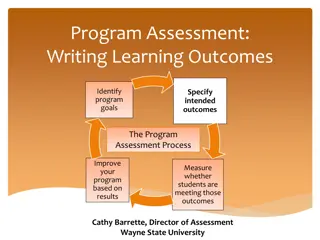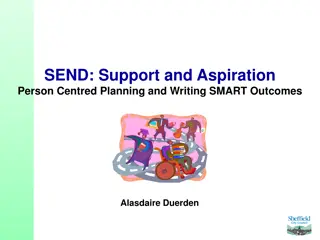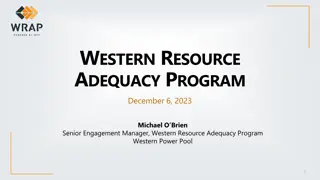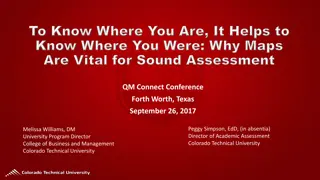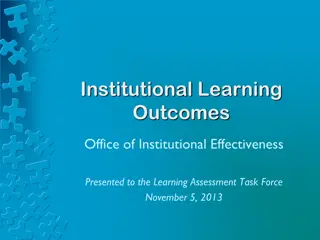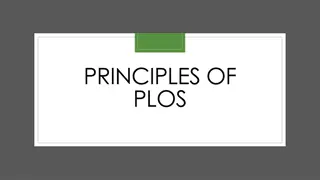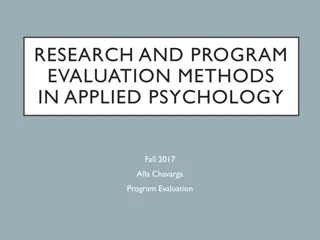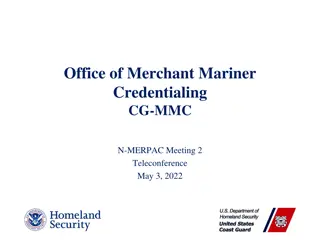Nutrition and Health Program Progress in Lao PDR
World Vision International is implementing a comprehensive nutrition and health program in multiple provinces of Lao PDR from 2020 to 2026. The program focuses on training healthcare staff, improving access to healthcare services, strengthening nutrition services, and promoting healthy practices for
2 views • 16 slides
Conducting an Outcomes Review Meeting for Program Analysis
This document discusses the process of conducting an outcomes review meeting as a method for program analysis in the context of a CME program. It outlines the objectives, program analysis criteria, and self-study questions related to evaluating the effectiveness of CME activities in meeting the prov
3 views • 28 slides
Welcome to Columbus State Nursing Program, Autumn 2023
Congratulations on your acceptance to the Nursing Program at Columbus State Community College! The Associate Degree Nursing Program offers a rigorous curriculum, but the faculty and staff are dedicated to supporting you every step of the way. Stay informed about COVID-19 updates affecting the progra
1 views • 34 slides
Comprehensive Perinatal Services Program (CPSP) Overview
CPSP is a program in California that provides enhanced perinatal services for pregnant Medi-Cal eligible women to improve birth outcomes and reduce health care costs. The program aims to decrease low birth weight, improve pregnancy outcomes, and ensure every baby gets a healthy start in life. Being
0 views • 19 slides
Understanding Multinomial Distribution in Statistical Analysis
Multinomial Distribution is a powerful tool used in statistical analysis to model outcomes of events with multiple categories. This distribution is applied to scenarios where each trial has several possible outcomes, and the sum of probabilities of all outcomes is equal to 1. By defining random vari
0 views • 8 slides
Understanding Academic Accreditation and Program Evaluation
Academic accreditation aims to assure stakeholders of program quality, aligning with international standards. Accreditation applies to programs, not institutions. Different types of accreditation exist, such as initial program accreditation and renewal of program accreditation. Programs consist of f
0 views • 24 slides
Delaware LIHEAP and Weatherization Assistance Program Details
In Delaware, the Low-Income Home Energy Assistance Program (LIHEAP) is managed by DHSS and DNREC, offering various components like Fuel Assistance Program (FAP) and Crisis Intervention Program (CIP). The program includes eligibility criteria, assistance types, and the Weatherization Assistance Progr
1 views • 5 slides
Welcome to the Nursing Program at Columbus State Community College
Congratulations on your acceptance to the Nursing Program at Columbus State Community College! The Associate Degree Nursing Program offers a rigorous curriculum supported by faculty and staff to help you succeed. The program outcomes focus on safe and patient-centered care, utilizing evidence-based
0 views • 31 slides
Principles of Integrated Design and Alignment in Course Development
Explore the significance of alignment in course and assessment design, program development factors, defining learning outcomes, designing assessments, and the interconnection between outcomes, tasks, feedback, and grading. Understand how integrated design shapes teaching and learning processes suppo
0 views • 23 slides
Understanding Course Outcomes and Program Attainment in Engineering Education
Graduates of engineering programs in India are required to attain Program Outcomes (POs) identified by the National Board of Accreditation (NBA) through courses, projects, and activities. Course Outcomes (COs) define what students should be able to do at the end of a course and play a crucial role i
0 views • 63 slides
Baby Falls Prevention Program at Rotunda Hospital
The Baby Falls Prevention Program at Rotunda Hospital aims to reduce the incidence of postpartum neonatal falls, which can cause serious harm to newborns. By increasing staff awareness, educating parents, and introducing safer adult beds and neonatal cots, the program seeks to mitigate the risk of h
0 views • 4 slides
Understanding Outcome-Based Education in Engineering Programs
Outcome-Based Education (OBE) focuses on assessing student learning outcomes and program effectiveness in fields like engineering. It aims to produce graduates who meet industry needs, exhibit proficiency in applied knowledge, and demonstrate essential skills and ethical values. OBE involves definin
0 views • 30 slides
Understanding EHCP Outcomes and Provision for Special Educational Needs
EHCP outcomes and provision for special educational needs are crucial components outlined in a child or young person's Education, Health, and Care Plan (EHCP). Long-term outcomes are categorized into learning areas, while medium-term outcomes serve as steps towards achieving long-term goals. It is i
0 views • 15 slides
Understanding the Dynamics of Program and Contract Management Team
The Program Management Contract Management Team, led by Joe Hidalgo, explores the synergy and conflicts between Program Managers and Contract Managers. Highlighting the importance of harmonizing business and program management skills for successful program execution in R&D environments, the content
1 views • 35 slides
Effective Mapping Strategies for Aligning Student Learning Outcomes (SLOs) with Program Learning Outcomes (PLOs)
Explore effective strategies for aligning Student Learning Outcomes (SLOs) with Program Learning Outcomes (PLOs) to enhance PLO assessment. Understand the connection between PLOs and SLOs as key elements in the education mapping process. Discover top-down and bottom-up approaches to strategically ma
1 views • 13 slides
Engineering Graduate Attribute Development Workshop at Queen's University
This workshop, led by Brian Frank, Director of Program Development at the Faculty of Engineering and Applied Science, focused on applying assessment principles to CEAB graduate attribute requirements and planning processes for program improvement. The session outcomes included using tools, technolog
0 views • 76 slides
Implementing New Assessment Cycle for Anthropology BA/BS Program
This plan details the implementation of a new assessment cycle for the BA/BS in Anthropology program at UA, focusing on key elements such as required coursework mapping, program student learning outcomes, assessment based on a 7-year schedule, and submission deadlines for reports. The program aims t
0 views • 7 slides
Rethinking Program Evaluation: Embracing Outcome Trajectories
Program evaluators are encouraged to shift focus from the traditional program theory of change to exploring outcome trajectories, which consider the broader context and interlinked changes over time. This approach offers a more insightful understanding of program outcomes and their evolution. An exa
0 views • 18 slides
Understanding Logic Modeling for Effective Program Development
Explore the fundamentals of logic modeling through "Picturing Your Program: An Introduction to Logic Modeling" by Yvonne Watson from the U.S. Environmental Protection Agency. Discover the purpose, components, and benefits of logic models in program planning, design, communication, implementation, an
1 views • 36 slides
Academic Assessment Workshop on Program Educational Objectives and Student Outcomes
Understanding the significance of Program Educational Objectives (PEO) and Student Outcomes (SO) in academic assessment. PEO outlines career achievements while SO specifies knowledge and skills expected from graduates. Explore the anatomy of PEO, ABET Student Outcomes, and Program Specific Outcomes
0 views • 58 slides
Exploring Long-Term Employment Outcomes of Vocational Rehabilitation Applicants
This study utilized linked administrative data to examine the outcomes of Vocational Rehabilitation (VR) applicants up to 7 years after program exit. Findings showed varied outcomes based on employment status at closure, with better results for those who closed with employment. The research linked R
0 views • 20 slides
Utilizing Multiple Sources of Evidence for Program Evaluation
This presentation by Jo Durham discusses the methodological framework for evaluating programs, focusing on causal mechanisms. It explores how participant reasoning and program resources combine to influence program success at different levels. The discussion also covers the impact of household livel
0 views • 36 slides
Understanding Learning Outcomes: Analogies and Examples
Explore the concept of learning outcomes through analogies with salads and maps. Learning outcomes are specific, measurable statements of what students should know or be able to do after completing a program. Discover how outcomes differ at various organizational levels and how course outcomes contr
0 views • 10 slides
Program Assessment Planning in Higher Education
This workshop series focuses on elements of a good program assessment in higher education, guiding participants through developing program goals, identifying student learning outcomes, creating curriculum maps, and implementing assessment plans. The process emphasizes using data to inform program im
0 views • 8 slides
Building a Logic Model for Effective Program Planning
A logic model serves as a vital framework in program planning, linking activities to outcomes and goals. By following structured steps like defining goals, determining outcomes, and outlining activities based on best practices, organizations ensure that their programs align with intended objectives
0 views • 11 slides
Aligning LEP Program Student Learning Outcomes with Assessment Goals
This project aims to address concerns about LEP assessment alignment, engage in discussions on SLOs, affirm current alignments, identify gaps, and support the program self-study process. Assessment is key in discovering student learning, meeting program goals, and improving future outcomes. The Libe
0 views • 10 slides
Effective Design of Learning Outcomes and Assessments
This session covers writing measurable learning outcomes, designing assessments aligning with outcomes, creating assessments for specific outcomes, analyzing assessments to determine intended learning outcomes, and the importance of clarifying expectations for students and instructors through learni
0 views • 16 slides
Georgia WIC Registered Dietitians Workforce Development Program
The Georgia Department of Public Health offers a WIC Dietetic Internship program aimed at recruiting and developing nutritionists and registered dietitians. This program addresses the lack of dietitians in Georgia, particularly in rural areas, through a competency-based supervised practice approach.
0 views • 41 slides
Enhancing Oral Healthcare through Dental Case Management Program
This professional education program aims to improve the quality of oral healthcare by providing dental workforce with training modules addressing appointment compliance barriers. Participants learn to identify opportunities in case management services, understand patient needs assessment, document c
0 views • 33 slides
Public Health Outcomes Framework for Wales Presentation Overview
This presentation provides an in-depth look at the Public Health Outcomes Framework (PHOF) for Wales, outlining its structure, key indicators, and overarching outcomes. The framework encompasses 13 outcomes across 3 domains, with a focus on promoting public health and addressing social determinants.
0 views • 21 slides
Effective Student Learning Outcomes Assessment at the Program Level
Clarify the process for conducting Student Learning Outcomes Assessment at the Program Level by completing a Program Curriculum Map and an Outcomes Assessment Plan. Understand the activities for a 5-Year Cycle, ensure Program Integrity, and learn what to include in a Program Plan. Develop Program Mi
1 views • 23 slides
Understanding Public Audiences Learning Outcomes for Youth
Delve into the world of public audiences and youth learning outcomes to uncover the impacts intended for projects and programs. Explore how to craft effective learning outcome statements, identify where to find learning outcomes, and discover different categories of learning outcomes expressed as kn
0 views • 18 slides
Enhancing Program Assessment through Learning Outcomes
Learning outcomes are specific, measurable statements that define what graduating students should know, be able to do, believe, or value. Explicitly stating learning outcomes helps in expressing program benefits clearly to stakeholders, attracting students, and securing donations and resources effec
0 views • 15 slides
Enhancing Person-Centred Planning and Writing SMART Outcomes in Sheffield City Council
Explore Sheffield City Council's commitment to person-centred planning and SMART outcomes for individuals with special educational needs and disabilities (SEND). Discover the focus on early identification, transparent information, and improved life outcomes through greater choice and control. Learn
0 views • 23 slides
Western Resource Adequacy Program Overview
Western Resource Adequacy Program (WRAP) is a vital initiative in the Western Power Pool, providing valuable grid integration and coordination services to its customer-members across the entire Western Interconnection. As the Program Administrator, Western Power Pool undertakes all necessary actions
0 views • 11 slides
Assessment and Curriculum Mapping in Higher Education
This presentation at the QM Connect Conference delves into the relationship between curriculum mapping and assessment for ensuring quality program content. Featuring speakers from Colorado Technical University, the session explores the university's mission, the College of Business and Management's c
0 views • 20 slides
Mesa Institutional Learning Outcomes Overview
Mesa's Institutional Learning Outcomes (ILOs) focus on core values such as communication, critical thinking, global awareness, personal awareness, civic responsibility, self-awareness, interpersonal skills, and technological awareness. These outcomes are designed to guide students in acquiring essen
0 views • 13 slides
Understanding Program Learning Outcomes (PLOs) in Education
Explore the significance of Program Learning Outcomes (PLOs) in educational settings, from defining learning outcomes to the methods of developing and implementing them. Discover how PLOs benefit program planning, curricular assessment, academic advising, institutional cohesion, and accreditation ev
0 views • 16 slides
Understanding Program Evaluation Methods in Applied Psychology
Program evaluation in applied psychology involves investigating the effectiveness and impact of social programs or interventions. Its goal is to assess whether the costs of a program are justified, not to produce generalizable knowledge. Evaluation seeks to reduce uncertainty for decision-makers and
0 views • 30 slides
Mariner Credentialing Program Transformation Overview
The Mariner Credentialing Program is undergoing significant transformations, as evidenced by various meetings, regulatory projects, policy publications, appeals statistics, and outcomes. Key developments include regulatory amendments, policy changes, and initiatives such as the IMO Sub-committee on
0 views • 12 slides



